
Immortal Regiment in Madrid: Don't be afraid to feel Russian
/ Главная / Russkiy Mir Foundation / Publications / Immortal Regiment in Madrid: Don't be afraid to feel RussianImmortal Regiment in Madrid: Don't be afraid to feel Russian
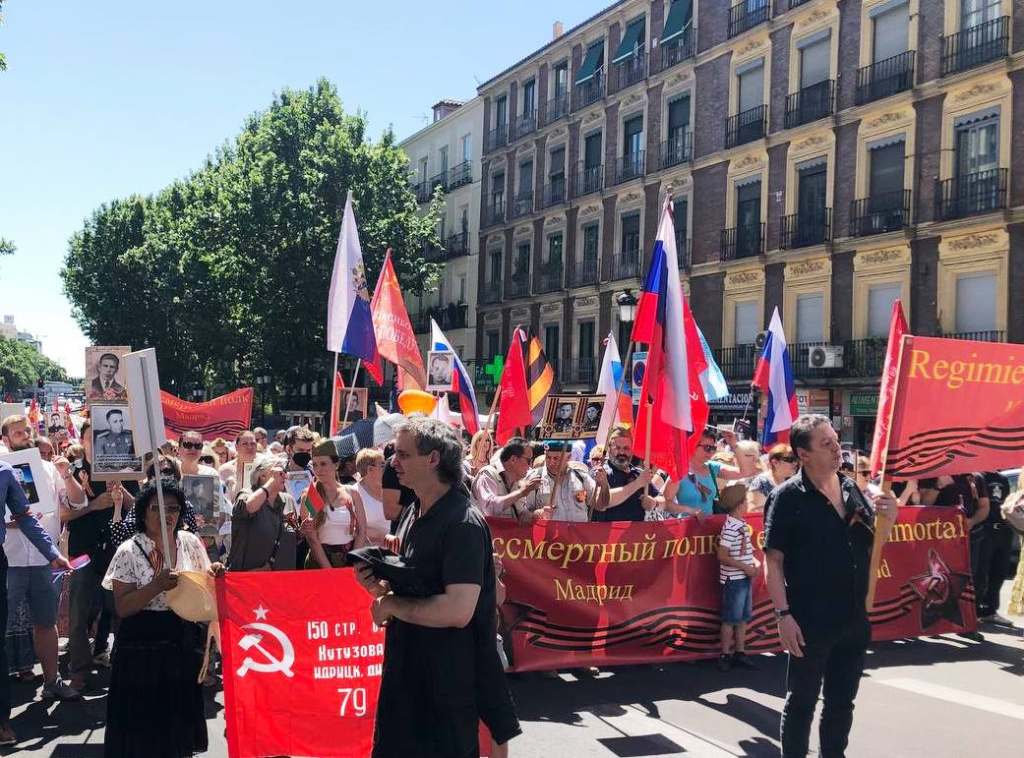
Photo credit: R. Demian
More than 1,000 people took part in the procession of the Immortal Regiment in Madrid. Russian and Spanish compatriots marched in the same line. While instigators tried to disrupt the march, law enforcement swiftly intervened and quelled their actions. Roman Demyan, one of the organizers of the demonstration, recounted the unfolding events during the Immortal Regiment in Madrid.
- There was a constant concern until the very last moment that the Immortal Regiment procession might not proceed as planned. What specific apprehensions did you have?
- We had obtained permission for our march through coordination with the Spanish authorities. However, on May 1st, Zelensky appealed to the Spanish government to prohibit the Immortal Regiment procession, and Gerashchenko echoed the sentiment on Twitter (the social network banned in Russia – the editor). Naturally, this made us somewhat uneasy. Although a direct ban on the march could not happen, there was a possibility of finding a formal pretext, such as an inability to guarantee the safety of the participants. Therefore we took preemptive measures by organizing our own security service and engaging Spanish lawyers who were prepared to challenge any potential ban.
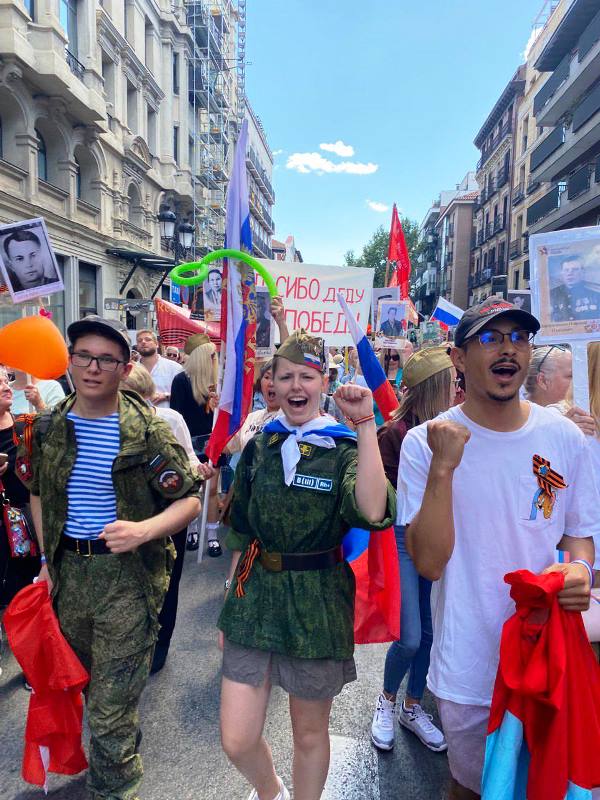
Photo credit: R. Demian
- We were also supported by the fact that Ukrainian politicians did not ask but demanded from the Spanish government to ban the Immortal Regiment procession. We have proceeded with the support of Spanish organizations. Such audacious demands greatly infuriated the Spaniards, and they stated that the march will definitely take place. It was a matter of principle. "How can Ukraine ban something that is guaranteed by our constitutional rights?" - That's how the Spanish marchers reacted. On some websites there were articles dedicated to this topic, asking on what grounds does Ukraine interfere in the internal affairs of Spain.
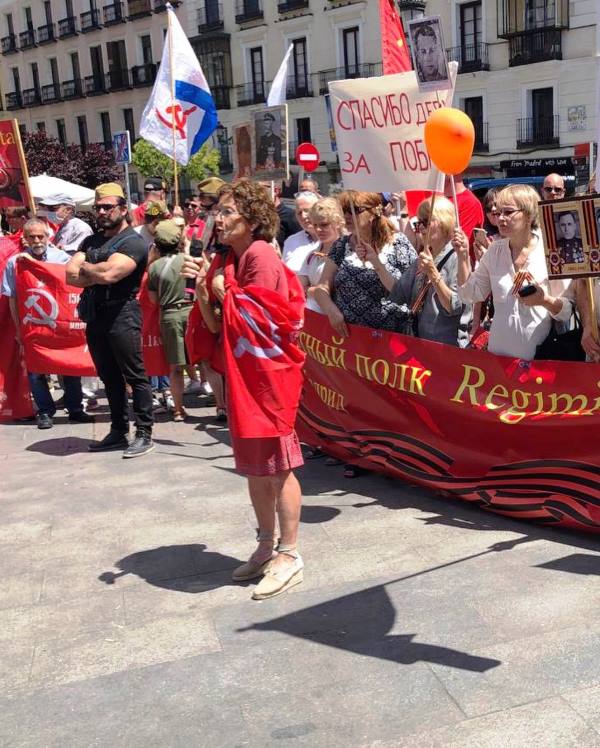
Photo credit: R. Demian
The only thing we feared was a provocation attempt. Since representatives of the so-called "Free Russia" group together with Ukrainians tried to hold a march in the same place where we had already received permission. Just like last year, the government refused them, but they have gathered there anyway. Our lawyers have interacted with the police, so they wouldn't let our opponents move and detained some of them. The police worked one 100%, and there was no provocation.
- Were there any clashes last year when Ukrainians tried to disrupt the procession of the Immortal Regiment?
- Yes, there was a provocation. A Ukrainian woman broke into the procession and tried to unfold the Ukrainian flag and raise a banner with photos from Bucha. Moreover, last year the organizers of this provocation brought people in buses from other cities, from refugee centers, trying to disrupt our march. However, the local police has ceased this provocation very quickly and. As far as I know, a criminal case was opened against this woman under four articles: she resisted the police and hit a policeman. Then she complained for a long time on social networks that she could not get a residence permit in Spain. Under the criminal case, she was not eligible to get such a permit.
This year, there were also attempts to orchestrate provocations. However, our security service was bolstered by highly skilled professional security guards. Furthermore, there was a significant presence of law enforcement. Interestingly, a week prior to the march, our itinerary was unexpectedly published on the website of the U.S. Embassy, even though we had not yet made an official announcement. There are other entities involved apart from Ukrainians.
- Who took part in the Immortal Regiment procession? You have mentioned that some people arrived from Portugal to participate.
- Yes, from Portugal, and also from all over Spain - Barcelona, Alicante, Valencia. The fact is that I have been providing humanitarian aid to Donbas since 2014, and in 2015 I was blacklisted on the “Myrotvorets (Peacemaker)” website (an extremist Ukrainian website banned in Russia for this. So many Spanish know me. Those who come from other Spanish provinces have also been participating in the Immortal Regiment procession for a number of years.
Spanish people know very well what fascism is. Spain's past is ambiguous, and difficult one. At the moment Spain is quite divided, and the fascism subject is very painful for them. Because part of Spain is Republican and part is pro-Franco. That is why, in my opinion, the Spanish government did not react to Ukrainian demands to ban our march. It could have further inflamed the internal civil conflict in Spanish society.
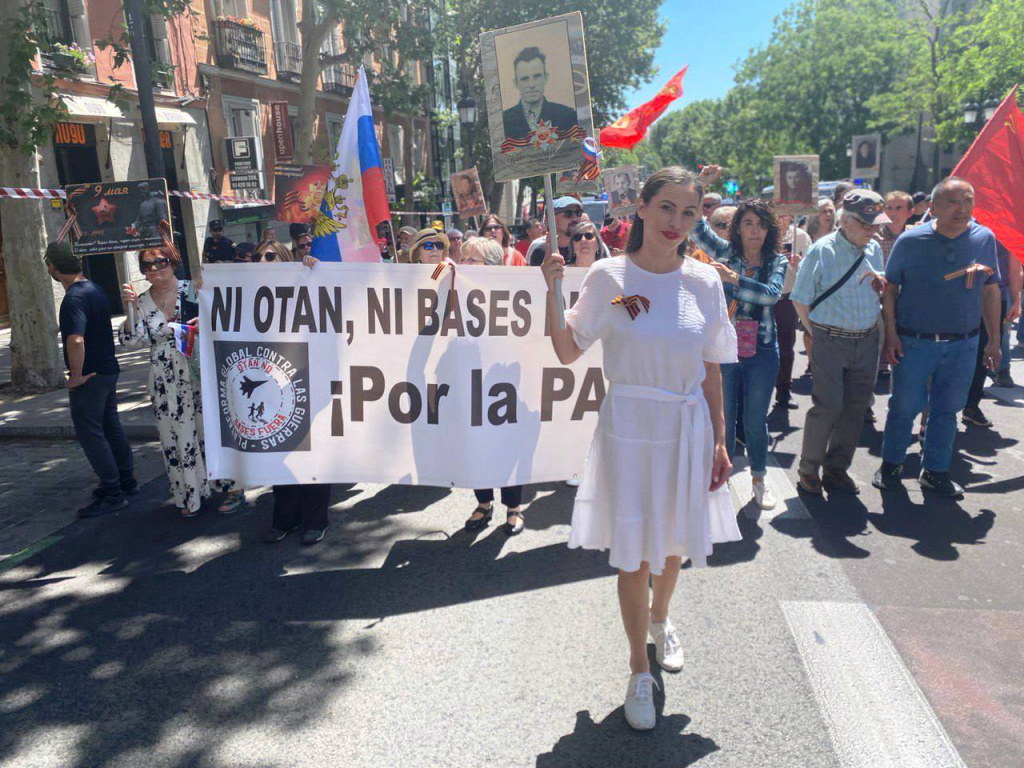
Photo credit: R. Demian
- There were many Spanish at the parade?
- I think it was fifty-fifty, Spanish and Russian people. By the way, during first Immortal Regiment procession we held in Madrid in 2016, we had 90% Spanish citizens.
You see, the organization of the Immortal Regiment should be done through the year, not two weeks before May, 9th. Our first Immortal Regiment we held on the basis of people who provided humanitarian assistance to Donbas. We always emphasize that this is not only our Russian holiday, we honor the memory of Spaniards who served in the Red Army. Therefore, we are trying to find common ground to attract local people to our procession. The main thing for us is to preserve the tradition of the Immortal Regiment procession and our common historical memory, because the people of Spain have also fought against fascism.
At the very end of the procession we observed a minute of silence to honor the memory of those perished in World War 2, including those who bravely fought against a contemporary state that promotes Nazi ideology.
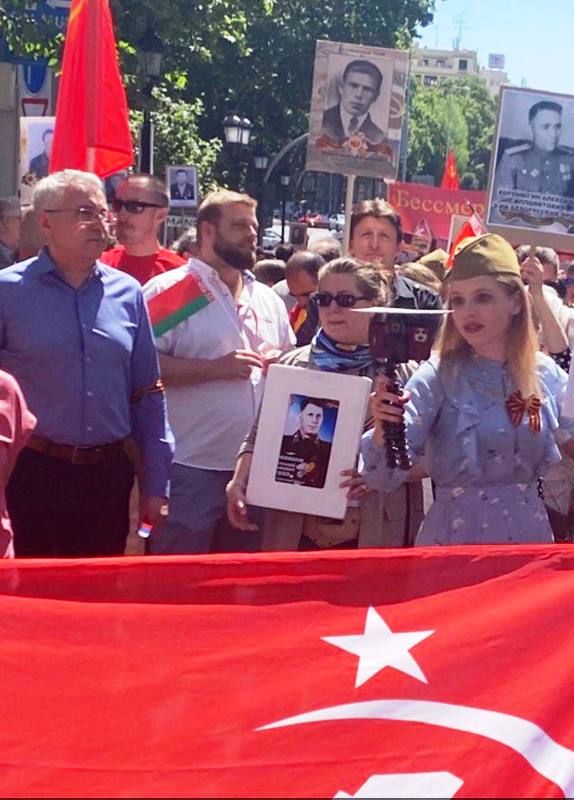
Photo credit: R. Demian
- Judging by the pictures, there were a lot of young people in your procession.
- Yes, there were a lot of young people. People trusted us, and when we told them that security would be provided, they weren't afraid to come with their children. When the march was over, our security service and the police took all the participants to the subway, so they calmly boarded the trains and went home. We do everything to not set people up, so there won't be any incidents.
- There were participants from Moldova and Belarus, where else?
- There were guys from Moldova, Armenia, from Belarus. Even Ukrainians were in our procession, including people from Ternopil (one of the major cities of Western Ukraine – editor).
There was a small rally at the end of our event. ASpanish singer performed anti-fascist songs, and a Spanish university teacher spoke about the history of the beginnings of fascism. At the end of the march an appeal of the All-Spanish Platform against NATO bases in Spain in support of the right to defend Russia's national interests, as well as its historic merits in the victory over fascism in 1945 were read out.
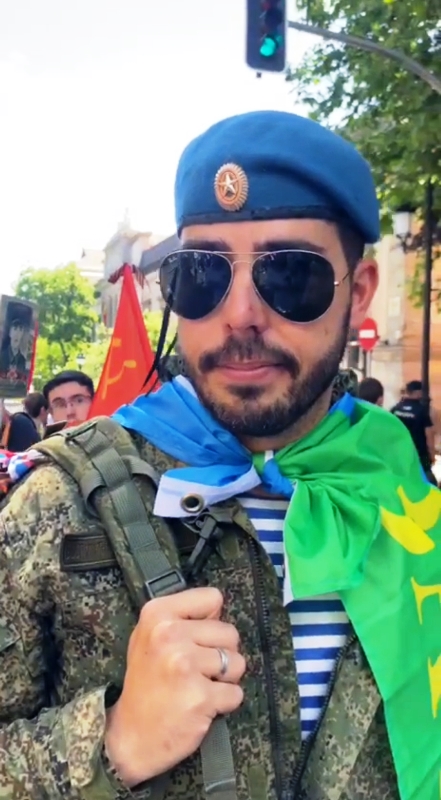
Photo credit: R. Demian
We do our best to involve local citizens in our events as much as possible. I always say that we should not be afraid to feel Russian. We should be proud of our country and shape its positive image through public diplomacy.
New publications

 Mikhail Kalatozov, a director who transformed the world of cinematography in many ways, was born 120 years ago. He was a Soviet film official and a propagandist. Above all, he was capable of producing movies that struck viewers with their power and poetic language.
Mikhail Kalatozov, a director who transformed the world of cinematography in many ways, was born 120 years ago. He was a Soviet film official and a propagandist. Above all, he was capable of producing movies that struck viewers with their power and poetic language.  Ukrainian authorities have launched a persecution campaign against the canonical Ukrainian Orthodox Church (UOC), the biggest one in the country's modern history. Over the past year, state sanctions were imposed on clergy representatives, searches were conducted in churches, clergymen were arrested, criminal cases were initiated, the activity of the UOC was banned in various regions of the country, and monasteries and churches were seized.
Ukrainian authorities have launched a persecution campaign against the canonical Ukrainian Orthodox Church (UOC), the biggest one in the country's modern history. Over the past year, state sanctions were imposed on clergy representatives, searches were conducted in churches, clergymen were arrested, criminal cases were initiated, the activity of the UOC was banned in various regions of the country, and monasteries and churches were seized.  When Nektary Kotlyaroff, a fourth-generation Russian Australian and founder of the Russian Orthodox Choir in Sydney, first visited Russia, the first person he spoke to was a cab driver at the airport. Having heard that Nektariy's ancestors left Russia more than 100 years ago, the driver was astonished, "How come you haven't forgotten the Russian language?" Nektary Kotlyaroff repeated his answer in an interview with the Russkiy Mir. His affinity to the Orthodox Church (many of his ancestors and relatives were priests) and the traditions of a large Russian family brought from Russia helped him to preserve the Russian language.
When Nektary Kotlyaroff, a fourth-generation Russian Australian and founder of the Russian Orthodox Choir in Sydney, first visited Russia, the first person he spoke to was a cab driver at the airport. Having heard that Nektariy's ancestors left Russia more than 100 years ago, the driver was astonished, "How come you haven't forgotten the Russian language?" Nektary Kotlyaroff repeated his answer in an interview with the Russkiy Mir. His affinity to the Orthodox Church (many of his ancestors and relatives were priests) and the traditions of a large Russian family brought from Russia helped him to preserve the Russian language.

 The leaders of the Friends of the Great Russia cultural association (Amici Della Grande Russia) in Italy believe that the Western policy of abolishing Russian culture in Europe has finally failed. Furthermore, it was doomed to failure from the beginning.
The leaders of the Friends of the Great Russia cultural association (Amici Della Grande Russia) in Italy believe that the Western policy of abolishing Russian culture in Europe has finally failed. Furthermore, it was doomed to failure from the beginning.  Name of Vladimir Nemirovich-Danchenko is inscribed in the history of Russian theater along with Konstantin Stanislavski, the other founding father of the Moscow Art Theater. Nevertheless, Mr. Nemirovich-Danchenko was a renowned writer, playwright, and theater teacher even before their famous meeting in the Slavic Bazaar restaurant. Furthermore, it was Mr. Nemirovich-Danchenko who came up with the idea of establishing a new "people's" theater believing that the theater could become a "department of public education."
Name of Vladimir Nemirovich-Danchenko is inscribed in the history of Russian theater along with Konstantin Stanislavski, the other founding father of the Moscow Art Theater. Nevertheless, Mr. Nemirovich-Danchenko was a renowned writer, playwright, and theater teacher even before their famous meeting in the Slavic Bazaar restaurant. Furthermore, it was Mr. Nemirovich-Danchenko who came up with the idea of establishing a new "people's" theater believing that the theater could become a "department of public education."  "Russia is a thing of which the intellect cannot conceive..." by Fyodor Tyutchev are famous among Russians at least. December marks the 220th anniversary of the poet's birth. Yet, he never considered poetry to be his life's mission and was preoccupied with matters of a global scale. Mr.Tyutchev fought his war focusing on relations between Russia and the West, the origins of mutual misunderstanding, and the origins of Russophobia. When you read his works today, it feels as though he saw things coming in a crystal ball...
"Russia is a thing of which the intellect cannot conceive..." by Fyodor Tyutchev are famous among Russians at least. December marks the 220th anniversary of the poet's birth. Yet, he never considered poetry to be his life's mission and was preoccupied with matters of a global scale. Mr.Tyutchev fought his war focusing on relations between Russia and the West, the origins of mutual misunderstanding, and the origins of Russophobia. When you read his works today, it feels as though he saw things coming in a crystal ball...